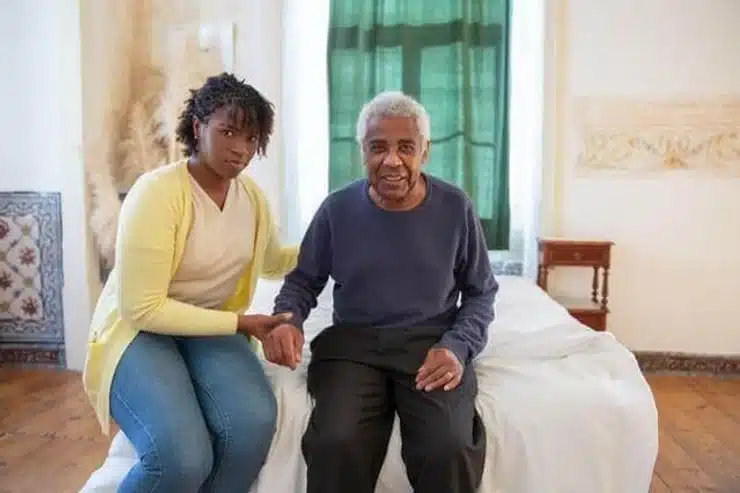It’s good to be home, especially for seniors who feel the most comfortable and secure in the home they love. More and more, seniors are expressing their wishes to remain at home and live independently even when they need a bit of assistance.
Safety is one of the biggest concerns family members have when helping to make the decision about whether a loved one can remain living at home
With that in mind, we’ve put together the following home safety checklist for seniors living in their homes:
Inspect the home for fire hazards. Many seniors have difficulty with mobility. Fire hazards can prevent them from exiting the home safely during a fire. Look for the following hazards:
-
Old batteries in smoke detectors and carbon monoxide detectors
-
Frayed or worn electrical cords
-
Power bars with too many plugs in them
-
Candles
-
Electric blankets
-
Space heaters
Clear walkways. Remove items that impede walking or pose a trip hazard from traffic patterns. Prevent injuries from falls by taking the following steps:
-
Clean up clutter
-
Move furniture to accommodate wider walkways
-
Add non-slip backings to throw rugs Provide non-skid rugs
-
Unplug electrical cords that stretch across the floor
-
Purchase non-slip shoes for indoor use for seniors
Make bathrooms safer. Slippery bathroom floors can cause seniors to fall and other modifications can make bathrooms safer. Consider the following bathroom modifications:
-
Replace bathtubs with walk-in showers
-
Install grab bars in the toilet and shower areas
-
Install a raised toilet stool seat
-
Add rubber mats in the tub and shower
-
Install a bathing chair in the shower
Improve the living areas for safe movement. The following suggestions may be used in various areas of the senior’s home:
-
Add a stairlift for seniors who can’t manage stairs easily
-
Add night lights to the bathroom and hallways
-
Replace bulbs with bright bulbs throughout the house
-
Add a peephole or remote door camera or alarm to the front door
Home Safety Tips for Seniors with Dementia
Dementia poses many safety hazards for seniors, and an elderly home safety checklist is in order. Recommended When dementia progresses and seniors wander or have significant memory loss, they need supervision. Caregivers should take the following precautions when caring for seniors with dementia:
-
Swap out old appliances with appliances that have auto-shutoff features.
-
Install hidden circuit breakers and gas valves so fireplaces and kitchen ranges can’t be left on.
-
Install finger guards on garbage disposals, cover the switches with safety locks, or disconnect them.
-
Lock cabinets and drawers that contain knives, medications, and cleaning supplies.
-
Lock garages and basements that house dangerous machinery, tools, or harmful chemicals.
-
Move locks on exterior doors so they are too high or too low for wandering seniors to reach, and add deadbolts where needed.
-
Remove locks from bedroom and bathroom doors to prevent accidental lock-ins.
-
Move light switches throughout the home to where seniors can reach them easily and prevent them from being disoriented. So that they are not confused when looking for them.
Be Proactive with Home Safety for Seniors
Home safety for the elderly is paramount. Unfortunately, seniors don’t always realize their homes aren’t safe. A few small changes in their living environment can make a world of difference.
Rather than wait for an accident or emergency to occur, be proactive in your approach to senior safety. The right precautions reduce the risk of falls and injuries, making it safer for seniors to remain at home as long as possible.
Any Home Is Adaptable for Elderly Safety
For us, quality elder care and home care is all about bringing healing to families and freedom to our clients, in the comfort of their homes. We understand that the warmth of home extends beyond the walls. It’s in the embrace of a caregiver, the assurance of attentive care and the unwavering support that defines family.
Home is the best Medicine – it is a nurturing and healing space. We live by this mantra and we work to tailor care plans that are unique to each individual. Our goal is to ensure every family we serve thrives under attentive and specialized care.
Caregiving is not just our specialty – it’s our Calling.
- Caring for the Caregiver: Managing Stress During Stress Awareness Month - April 17, 2025
- Shining a Light on Parkinson’s: Support and Awareness for Families - April 1, 2025
- Eat Well, Live Well: Nutrition Tips for Healthy Aging - March 18, 2025




